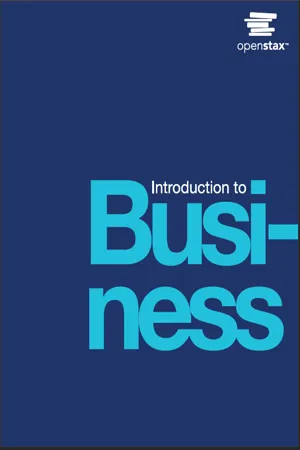Business
Selling Securities
Selling securities refers to the process of offering and selling financial instruments such as stocks, bonds, and mutual funds to investors. This is typically done through a brokerage firm or investment bank, which acts as an intermediary between the issuer of the securities and the investors. The sale of securities is regulated by government agencies to ensure transparency and protect investors.
Written by Perlego with AI-assistance
Related key terms
1 of 5
5 Key excerpts on "Selling Securities"
- eBook - PDF
- Lawrence J. Gitman, Carl McDaniel, Amit Shah, Monique Reece, Linda Koffel, Bethann Talsma, James C. Hyatt(Authors)
- 2018(Publication Date)
- Openstax(Publisher)
Sales for which a firm has not yet been paid. Letter grades assigned to bond issues to indicate their quality or level of risk; assigned by rating agencies such as Moody’s and Standard & Poor’s (S&P). Long-term debt obligations (liabilities) issued by corporations and governments. National and regional securities exchanges that bring buyers and sellers together through brokers on a centralized trading floor. The process of analyzing long-term projects and selecting those that offer the best returns while maximizing the firm’s value. Investments in long-lived assets, such as land, buildings, machinery, equipment, and information services, that are expected to provide benefits over a period longer than one year. The inflow and outflow of cash for a firm. The process of making sure that a firm has enough cash on hand to pay bills as they come due and to meet unexpected expenses. Corrective measures that, under certain conditions, stop trading in the securities markets for a short cooling-off period to limit the amount the market can drop in one day. Unsecured short-term debt—an IOU—issued by a financially strong corporation. A security that represents an ownership interest in a corporation. Securities markets where buy and sell orders are executed through dealers, or “market makers,” linked by telecommunications networks. Payments to stockholders from a corporation’s profits. Private trading networks that allow institutional traders and some individuals to make direct transactions in the fourth market. A security similar to a mutual fund; holds a broad basket of stocks with a common theme but trades on a stock exchange so that its price changes throughout the day. A form of short-term financing in which a firm sells its accounts receivable outright at a discount to a factor. The art and science of managing a firm’s money so that it can meet its goals. The chance that a firm will be unable to make scheduled interest and principal payments on its debt. - eBook - PDF
- Janette Rutterford, Marcus Davison(Authors)
- 2017(Publication Date)
- Red Globe Press(Publisher)
So companies and governments issuing new securities in the primary market are indeed supplying assets for the market to distribute to purchasers. But once a new marketable security has been sold to an initial investor, this is not the end but only the beginning of the story. A key feature of the stock market is that a security can continue to be bought and sold among market participants in a secondary market for as long as it has value, that is, for as long as it is expected to produce some future cash flows for the holder. So financial assets do not just pass through the market as if along a one-way street; they also circulate within it. In this respect the market for securities may appear to be similar to markets for second-hand or previously-owned goods such as cars, houses or antique furniture. But the big difference is that the value of a security, unlike that of a house or a car, is not affected by the fact that it has been previously owned per se , still less by how well it has been looked after, or even by how old it is. The value of a security depends exclusively on its expected future cash flows, so it is not a backward-looking but a forward-looking concept. The structure of the securities markets is further complicated by the fact that the companies and governments that supply new securities to the market are also active as buyers of other issuers’ new securities and as buyers and sellers of previously issued secu-rities. And as if all this were not enough, in many securities markets, and especially in those of the most advanced economies, it is possible for investors to sell securities they do not already own. All of this makes the job of organising, regulating and understand-ing the market rather more complex than in the case of a conventional market for goods or services. - eBook - ePub
- Alastair Hudson(Author)
- 2017(Publication Date)
- Routledge(Publisher)
Therefore, this chapter will not consider private companies until the very end, because the principal focus of securities law is on issues of securities to the public at large by public limited companies. First, however, we shall consider what is meant by a ‘security’ by examining the use of bonds and shares in raising money from investors. (For a more detailed discussion of these regulations you should refer to Alastair Hudson, Securities Law, 2013a generally, or Alastair Hudson, The Law of Finance, 2013b.) The mechanics of securities markets in raising capital for companies There are two ways in which a company can raise money: it can borrow it or it can issue shares. Borrowing money can be done by means of an ordinary loan or it can be done by issuing bonds. Bonds are a form of security that can be bought and sold like shares. In a bond issue, the company issues a large number of bonds of equal value and carrying equal rights; investors buy those bonds by paying the purchase price of the bond to the issuing company. The company is then obliged to pay interest periodically to the investors and is obliged to repay the purchase price of the bond at the end of the life of the bond. As a result, the company acquires a loan provided collectively by all of the investors, it pays interest (just like an ordinary loan) and it is required to repay the loan at the end of the contractual term (just like an ordinary loan). Significantly, the investors acquire securities in the form of the bonds: the important part about a security is that it can be sold. Therefore, the investors may be speculating on the movements in the value of the bonds on the open market, instead of simply waiting to receive interest on their ‘loan’ to the company. Usually there is a ‘trustee’ appointed over the bond issue to ensure that payment is made and to activate the default provisions in the documentation if the issuing company breaches any of its obligations - eBook - PDF
- Nicholas L. Georgakopoulos(Author)
- 2017(Publication Date)
- Cambridge University Press(Publisher)
As we saw in Chapter 4, the function of the definition of a security is the separation of goods that are primarily subject to the buyer’s inspection and future control from those that buyers tend not to inspect or control. The focus on inspection matches the subjective valuation of supply and demand versus the objective valuation of the CAPM. The focus on control aligns with active use of real goods versus the passive investment in securities. Noting this agreement of the economic and legal understandings of securities, we can turn to a jurisprudential moment where they appear to have deviated. 42 Pricing Mechanisms 6 From the Sale-of-Business Doctrine to Gustafson The legal definition of a security – a presumed intent to invest in a common enterprise with an expectation of profits mostly from the effort of others – and its analysis as an investment with neither access to information nor control are consistent with the economic understanding of a security as a passive investment. The courts, however, have followed a tortured path in applying this analysis to sales of controlling blocks of shares and to private transactions generally. According to the “sale-of-business doc- trine,” sales of controlling blocks of shares were not sales of securities; therefore, the buyer had neither the rescission remedy nor other securities law protections. Then, in 1985, the US Supreme Court overturned the sale-of-business doctrine with Landreth and Ruefenacht, 1 giving buyers of control the right to rescind remedy and other securities law protections. A few years later, in a move of legal whiplash, the Court in Gustafson granted a reprieve from the remedies of securities law to a seller of a controlling block of shares. 2 This reprieve was both broader and narrower than that of the sale-of-business doctrine. It exempted all private transactions from the rescission remedy of securities law, but buyers retained all other securities law protections. - eBook - PDF
Commerce
Made Simple
- Geoffrey Whitehead(Author)
- 2016(Publication Date)
- Made Simple(Publisher)
17.2 A world-wide network of stock exchanges. dney Auckland MeìBourne Jfyfelljngton DunedÌT* r f e t c h u r c h 232 Commerce get his money back is to sell the shares for what they will fetch in the market place. This is what the Stock Exchange is: a market where those who wish to sell shares are able to contact those who wish to buy. The company whose shares are being bought and sold has little interest in the matter, but it will register the transfer of shares in order to keep its list of share-holders up to date. The company merely pursues its lawful activities, as laid down in its Memorandum of Association, leaving the specialist dealers on the stock exchange to arrange matters when the public wish to buy or sell securities. A company may, however, be interested if a particular buyer is acquiring large blocks of shares, since a take-over may be under consideration. 17.3 Types of Security A security is a written or printed document acknowledging the investment of money. The investor may merely loan the money in return for interest, or may actually purchase a share in the enterprise concerned, in which case the reward to the investor is a share in the profits of the enterprise. This reward is called a dividend, because the profit is divided among the shareholders. The word 'securities' covers all kinds of investment with which the Stock Exchange is concerned. Generally speaking they are 'existing securities', i.e. they have already come into existence at some earlier date. The Stock Exchange does not itself issue new shares to the public. This function is often performed by specialist institutions called issuing houses. For a successful new issue, the Stock Exchange still has a vital part to play, for the public will be unwilling to buy the issue unless there is a guarantee that they will be able to sell them again should they wish to do so. Most new issues are therefore announced 'subject to permission to deal being given by the Stock Exchange Council'.
Index pages curate the most relevant extracts from our library of academic textbooks. They’ve been created using an in-house natural language model (NLM), each adding context and meaning to key research topics.




